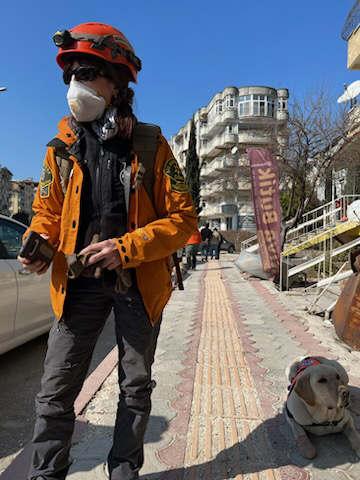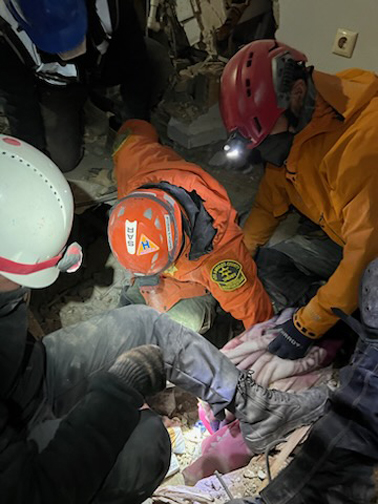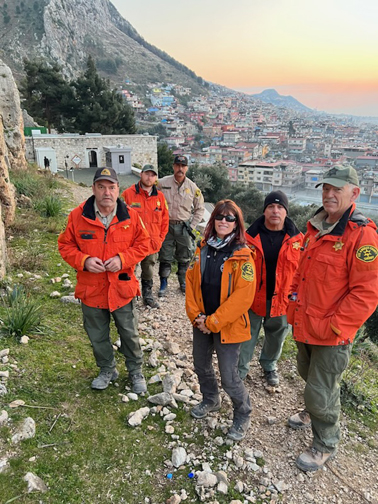
Photos provided by Cindy ENGLAND
By Mary O’KEEFE
Recently members of the Los Angeles County Sheriff’s Dept. – Montrose Search and Rescue (MSAR) team traveled to Turkey joining an international effort to help those affected by the Feb. 6 massive earthquake.
The earthquake was close to Turkey’s border with Syria. It struck at 4:17 a.m. local time and has been recorded as a 7.8 magnitude earthquake. (The 1994 Northridge earthquake registered as a 6.7 magnitude.) The initial quake struck at a depth of 11 miles. Aftershocks numbered in the thousands. On Feb. 20 a 6.3 magnitude earthquake struck the Hatay Province in southern Turkey. More than 850,000 children remain displaced in Turkey and Syria; over 1.9 million people are seeking shelter in tents and temporary shelters in Turkey, and 500,000 people in Syria are homeless, according to World Vision.
According to reports out of Turkey, over 45,000 people have died due to the result of the earthquakes.
To say the country’s emergency responders and governments were overwhelmed is an understatement. According to reports from the BBC, over 160,000 buildings collapsed or were severely damaged in Turkey after the quakes. The international community immediately responded to the call for help with funding, equipment and boots on the ground volunteers.

One of those groups of volunteers responding was from MSAR and one of those MSAR members was Cindy England, the only woman in the group who headed to Turkey.
England said she didn’t really have any preconceived notions of how she would be accepted in Turkey.
“I wasn’t [sure] how they were going to treat me,” she said, adding she wasn’t sure how Turkish men would react to her being an emergency responder and working alongside all of the male responders.
“I was pleasantly surprised,” she said. “I was treated as an equal, and worked alongside the men.”
She did have her helmet on the entire time so she blended in easily with the other responders; however, she was the only female boots on the ground responder– at least in the area where she was working.
“We didn’t see Turkish women helping with the evacuations,” she said. “Most of the women were on nursing staffs.”
England said she was overwhelmed at how nice everyone was and how much residents appreciated their help.
The group had a rule that only two at a time would go into a building that had collapsed while the other members would wait outside.
“We would sit with the neighborhood [men] and drink tea with them,” she said.
The women would be across the street. Men and women socialized separately, she noticed. She did get to walk across the street occasionally and speak, or at least try to speak, to the women with the help of an interpreter.
“They were very quiet and would nod their heads,” she said of the women. “They didn’t talk even to the translator and were very quiet but you could tell they were very appreciative we were there.”
She did add that in addition to the offer of tea and food the men also offered cigarettes, which they smoked all day long.
She noted that she didn’t feel any resistance or even concern about being a female responder until the last day when the team members were getting ready to leave and she took off her helmet.
“It was just an interesting feeling I got,” she said.
She said that although all the men were still kind and supportive, as a woman – especially one who is doing a job that is traditionally a man’s – there was a type of “Spidey-Sense” (a vague but strong sense of something being wrong) that she experienced.
England said she has never felt that “not wanted” feeling from her fellow MSAR members or any of the search and rescue members she has worked with.
“When I started [search and rescue], I was with another team. There were only two women [on the San Dimas team],” she said when she started – and she was one of the two.
She added she never felt any animosity from her male team counterparts and has seen more of that “You don’t belong here” attitude from a male therapist in her field as a physical therapist.
“But I never felt that with search and rescue,” she said.
Being able to travel to Turkey and help those in need was an experience she will never forget.
She said her household is prepared for an earthquake but she feels the destruction she saw due to the Turkey earthquake can be used to educate others.
England added that though she felt welcomed and appreciated while in Turkey, the devastation is something that stays with her.
“When we first arrived a young woman with a baby on her hip just started crying. We had no idea what she was saying; we just knew she needed help. She had nowhere to live,” she said. “We saw that [desperation] throughout the time we were there. There were people weeping in the streets. It was hard to see but because we deal with so many [bad] scenarios on search and rescue and we are so professional we can deal with it.”
Other MSAR team members who traveled with England were Mike Leum, Robert Sheedy and Colin Lievense. The group also included Santa Clarita Search and Rescue member Brad Lyon, Altadena Search and Rescue member Marcos Rubio and LASD retired Sgt. Joe Larios.

